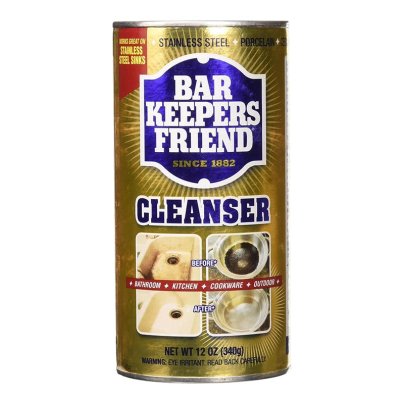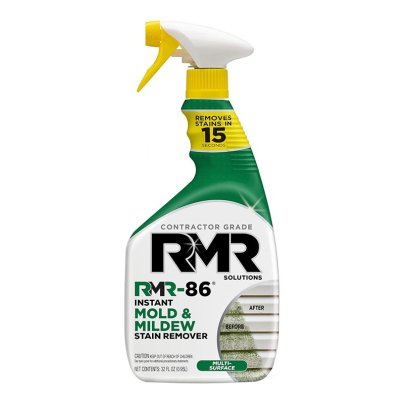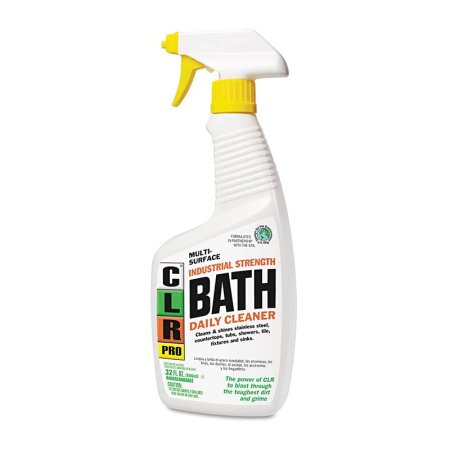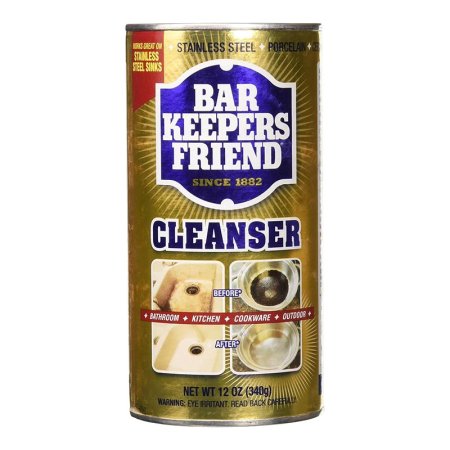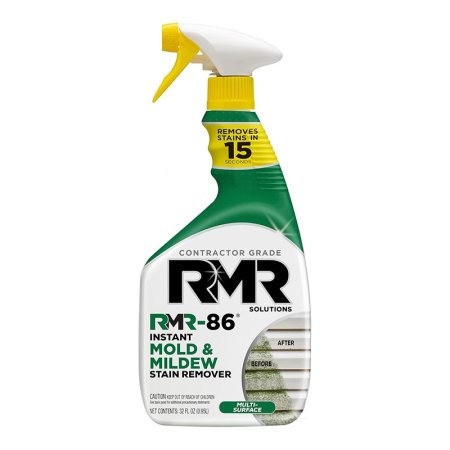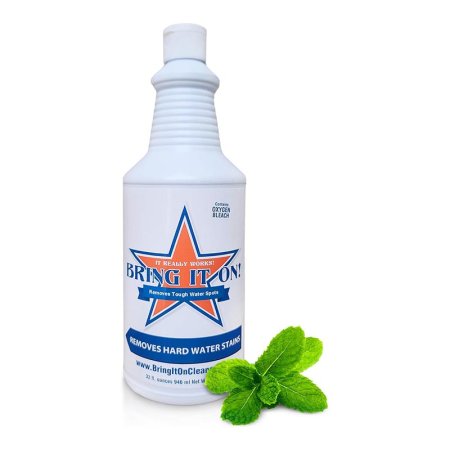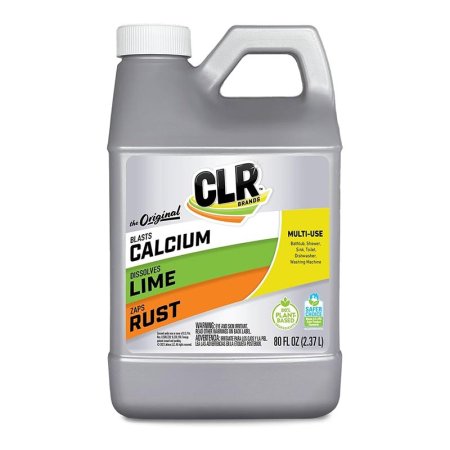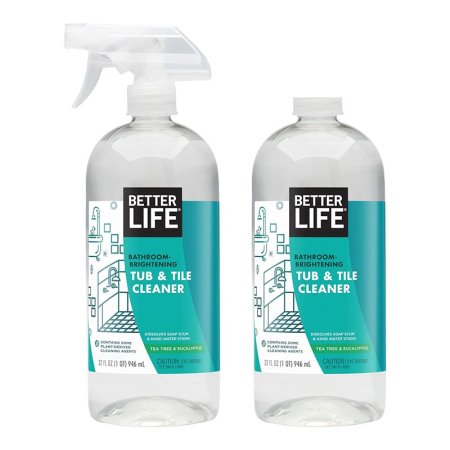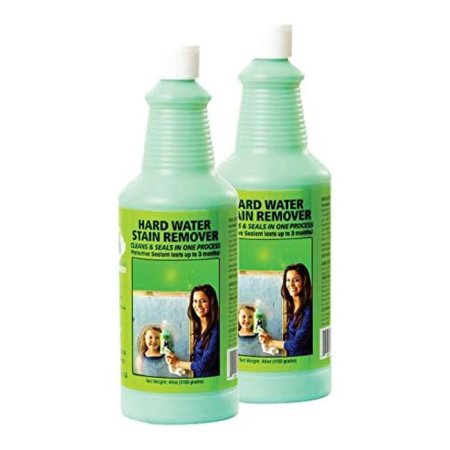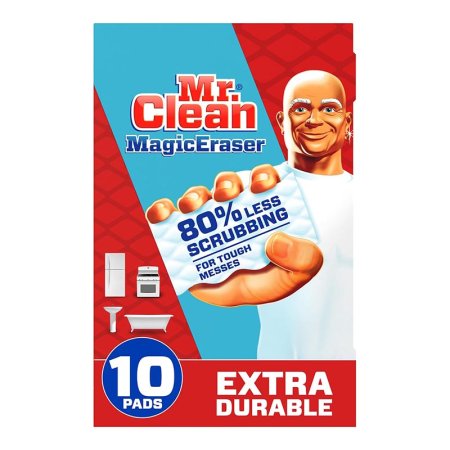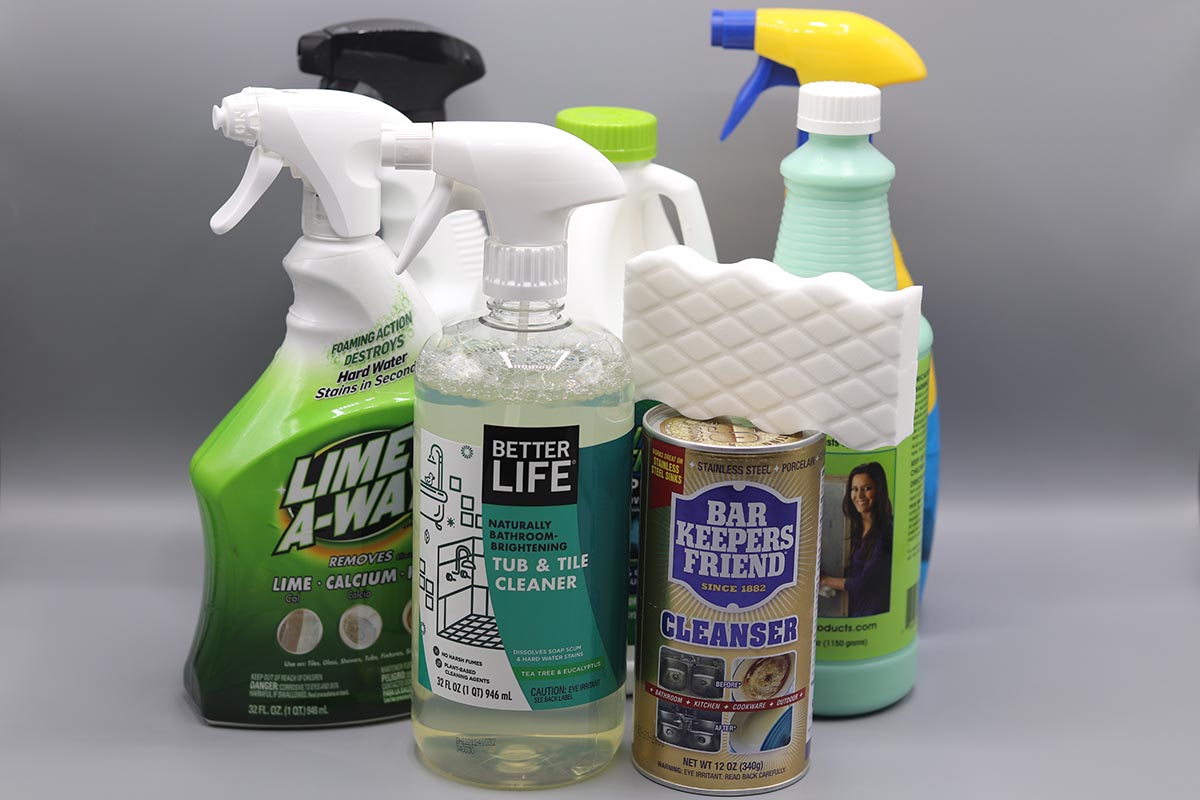
We may earn revenue from the products available on this page and participate in affiliate programs. Learn More ›
Cleaning the bathroom is no fun, especially when it comes to cleaning the bathtub. Straining over the bathtub’s edge to access those hard-to-reach areas while trying to scrub can be awkward and leave you with an aching back and sore knees. But when you match the right cleaning product with the right job, cleaning can be less strenuous and time-consuming. We researched and put to the test the top cleaners on the market to find the sprays, foams, and scrubbers that lighten the load on keeping your soaker clean.
A clean bathtub keeps mold, bacteria, and other minerals that are unsightly (and unhealthy) from building up in the bathroom. Of course, cleaning the tub does require effort, but the best bathtub cleaners can ease the process and get rid of the grossness. Here are some of the best bathtub cleaners available, with clear standouts and our testers’ go-to’s for their regular cleaning routines.
- BEST OVERALL: CLR Pro Industrial Strength Bath Daily Cleaner
- BEST BANG FOR THE BUCK: Bar Keepers Friend Powdered Cleanser
- BEST FOR MOLD AND MILDEW: RMR Solutions RMR-86 Instant Mold & Mildew Remover
- BEST FOR SOAP SCUM: Bring It On Cleaner Hard Water Stain Remover
- BEST FOR RUST STAINS: CLR Calcium, Lime, & Rust Remover
- BEST NATURAL: Better Life Tub and Tile Cleaner
- BEST FOR HARD WATER: Bio-Clean Products Hard Water Stain Remover
- BEST FOR STAIN REMOVAL: Mr. Clean Extra Durable Magic Eraser
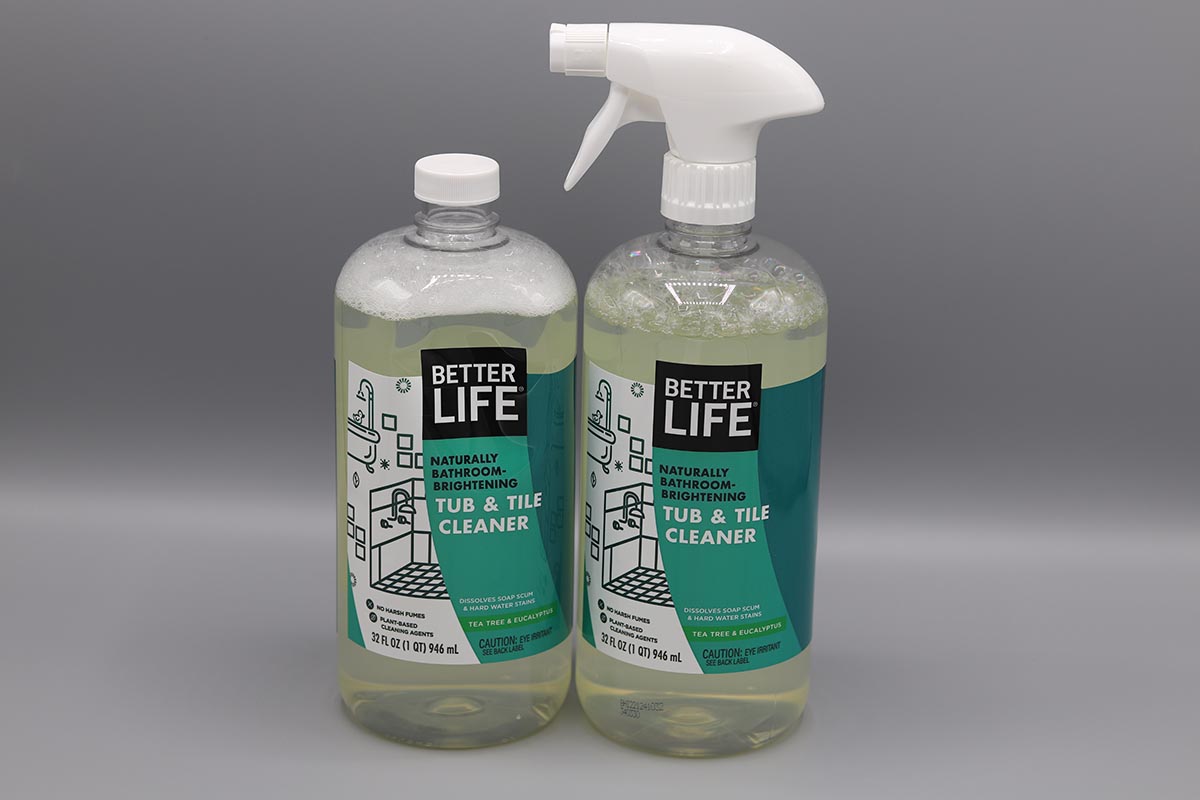
How We Tested the Best Bathtub Cleaners
We taped a bathtub into sections to test the cleaners side by side. If the cleaner was designed for a specific problem like mineral buildup, rust, or mold, we made sure to test it on that particular problem. We rated performance based on an established rubric, looking at how well the product performed in its specific category and how it did compared to the other cleaners in the test. We looked at ease of use, scent, and how well it cleaned. Cleaners were tried on different materials based on the manufacturer’s recommendations. We followed manufacturer instructions so that products were tested as intended.
Testing Stats
- Products tested: 10
- Hours spent testing: 20+
- Tests performed: 2 per product
- Average price: $16.88
Our Top Picks
Here’s an overview of some of the best bathtub cleaners on the market. This list of top performers is based on our in-person testing, along with the previously mentioned considerations, brand reputation, and product quality.
Best Overall
CLR Pro Industrial Strength Bath Daily Cleaner
Pros
- Easy to use and apply with a simple spray-and-wipe application
- Works on the bathtub but can be used almost anywhere in the bathroom
- Makes a dent in difficult stains like rust, calcium, lime, and hard water
Cons
- Can’t completely remove heavy, hard water buildup
Product Specs
- Form: Liquid spray
- Abrasive: No
- Ingredients: Water, lactic acid, lauramine oxide, tripropylene glycol n-butyl ether
Our Ratings: Ease of Use 5/5; Regular Buildup 5/5; Tough Stains 4.5/5; Scent 3/5; Value 4.5/5
CLR Pro cleaner is an industrial-strength formula that can handle bathroom cleaning from top to bottom. CLR Pro is designed to break down calcium, lime, and hard water deposits, with this particular formula being able to handle soap scum and general grime, too. It performed exceptionally well during testing, tackling general soap scum and grime with ease.
It’s safe for most bathroom surfaces, including glass shower doors, tile, stainless steel, fiberglass, granite, porcelain, and plastic. We tried it on glass and fiberglass, and it performed beautifully. Rust didn’t stand a chance, and it did a decent job removing mold and mildew.
CLR Pro is Environmental Protection Agency (EPA) Safer Choice certified and biodegradable. It does not have alcohol ingredients, ammonia, or bleach. It’s not scented, though it does have a general cleanser smell. CLR Pro performed better when used with a cleaning cloth than a paper towel. It made a dent in hard water stains but couldn’t remove the toughest buildup. However, we found that the only products that could remove heavy, hard water stains had some abrasive elements in the formula, which this one does not.
Get the CLR Pro bathtub cleaner at Amazon or Walmart.
Best Bang for the Buck
Bar Keepers Friend Powdered Cleanser
Pros
- Doesn’t take a lot of powder to be effective
- Works on tough stains, such as hard water and mineral deposits
- Relatively inexpensive, so it saves money on general cleaning costs
Cons
- Highly abrasive and can damage some surfaces
Product Specs
- Form: Powder
- Abrasive: Yes
- Ingredients: Oxalic acid, glass oxide abrasive, surfactant
Our Ratings: Ease of Use 4/5; Regular Buildup 5/5; Tough Stains 5/5; Scent 3/5; Value 5/5
Bar Keepers Friend helps remove pesky stains, but it’s also gentle enough to use on porcelain, fiberglass, and tile. However, this powder can scratch some surfaces, especially if you get enthusiastic while scrubbing—so it’s important to check with the manufacturer to determine which materials are safe to use the product on.
We used it in a fiberglass bathtub to remove a waxy film and mineral deposits left behind by well water. All it took was gentle scrubbing to remove both. We also tried it on mold and mildew collected in a glass shower door track. It did an excellent job of removing both, though we had to be careful because it started to wear away at the caulking.
This powdered cleanser polishes, too. Use it to scrub away lime and other mineral deposits from faucets and knobs. And Bar Keepers Friend cleanser isn’t just for the bathroom; you can use this multipurpose powder in the kitchen, the garage, and even on the grill and patio furniture. However, you may want to test the powder on the tub’s surface and grout before using it to ensure it won’t scratch or discolor the surface.
Get the Bar Keeper’s Friend bathtub cleaner at Amazon, The Home Depot (2-pack), or Walmart.
Best for Mold and Mildew
RMR Solutions RMR-86 Instant Mold & Mildew Remover
Pros
- Tackled difficult-to-remove mold and mildew in hard-to-reach locations
- Did not require much scrubbing to remove stains
- Concentration did not require a lot of product to be effective
Cons
- Strong bleachy scent that can be overwhelming
- Leaked during shipping
Product Specs
- Form: Liquid spray
- Abrasive: No
- Ingredients: Sodium hypochlorite, proprietary buffer, proprietary stabilizer, proprietary alkalinity booster, proprietary surfactant
Our Ratings: Ease of Use 4.5/5; Regular Buildup 5/5; Tough Stains 4/5; Scent 2/5; Value 4/5
Mold is no friend to people who suffer from allergies, autoimmune diseases, or respiratory infections, and it must be tackled early on to keep it from spreading to and penetrating various bathroom surfaces. But if mold is already present, RMR-86 removes the stains and odors that black mold and mildew leave between bathroom tiles, on grout, and on shower doors.
We tested RMR-86 in the track of a shower door and around the drain of a bathtub/shower, both locations where mold and mildew easily accumulate. It removed both. The instructions require leaving the solution on the mold and mildew until the stains disappear. We followed those instructions but found it performed better if we did some light scrubbing afterward.
No mixing is necessary. The stain remover is safe for typical bathroom surfaces, but it also can remove mold from wood, vinyl, drywall, and concrete. One of our testers lives in a humid area, where mold and mildew easily collect on windows. This is one of her top choices for keeping mold and mildew to a minimum.
Get the RMR bathtub cleaner at Amazon, The Home Depot, or RMRSolutions.
Best for Soap Scum
RMR Solutions RMR-86 Instant Mold & Mildew Remover
Pros
- Cream form worked well for scrubbing without being too thick or runny
- Easily removes soap scum with a minimum amount of scrubbing
- Doesn’t require a lot of cream to be effective on daily scum and grime
- Worked on mineral deposits and buildup with the help of a scrub brush
Cons
- Isn’t as easy to apply as sprays and foams
- Requires scrubbing, even though it was minimal
Product Specs
- Form: Cream
- Abrasive: Yes
- Ingredients: Oxygen bleach, silica, alcohol ethoxylate, sulfonic acid, water
Our Ratings: Ease of Use 3/5; Regular Buildup 3/5; Tough Stains 4.5/5; Scent 3/5; Value 4.5/5
Soap scum buildup is no accident: Those who live in an area with hard water probably battle it constantly. The Bring It On hard water stain remover not only helps remove soap scum, but it also removes the mineral deposits left behind by hard water to ensure the soap residue has nothing to cling to.
One of our testers has well water with hard water and mineral deposits that leave a waxy buildup along with hard water stains. Hand scrubbing with Bring It On removed soap scum without a problem. The abrasive was gentle on a fiberglass bathtub, leaving no scratches behind. We tried it on hard water stains on a shower glass door, too. Hand scrubbing didn’t completely remove the buildup, but then we tried Bring It On with a scrub brush attached to an electric drill, and the build-up didn’t stand a chance. It didn’t scratch the door and was one of only two products that could remove hard water stains.
This cleaner contains nontoxic oxygen bleach, so it’s safe to use where kids and pets bathe. It’s also safe for glass, tile, grout, and metal hardware (though be careful with how hard you scrub). And it’s not limited to the bathroom; you can also use Bring It On in the kitchen or the swimming pool area. The mint scent was a bit strange, like using Pepto Bismol in the bathroom, but not completely off-putting.
Get the Bring It On bathtub cleaner at Amazon or Bring It On Cleaner.
Best for Rust Stains
CLR Calcium, Lime, & Rust Remover
Pros
- Helped with hard water stains, especially around fixtures
- Removed rust and treated mildew well
- Comes in a concentrated form, giving users more options on how much to use
Cons
- Only works for specialized applications and performs similarly to some multipurpose cleaners in those specialized applications
Product Specs
- Form: Concentrated liquid
- Abrasive: No
- Ingredients: Water, lactic acid, gluconic acid, lauramine oxide, tripropylene glycol n-butyl ether, yellow no. 5, acid blue no. 1
Our Ratings: Ease of Use 4.5/5; Regular Buildup 4.5/5; Tough Stains 4/5; Scent 3/5; Value 2.5/5
This concentrated multipurpose cleaner from CLR targets rust, calcium, lime, and soap scum and works for targeted areas. It’s safe for use on plastic, ceramic tile, glass, stainless steel, metal fixtures, shower doors, fiberglass, toilet bowls, and sinks. The cleaner is EPA Safer Choice certified and a safe alternative to chemicals that contain phosphates, ammonia, or bleach.
This concentrated formula can be mixed with equal parts water and applied to surfaces or in full concentration. We mixed it with equal parts water and used it to clean a shower head with hard water buildup. It’s only meant to contact surfaces for 2 minutes before rinsing; this isn’t a set-it-and-forget it solution. We found that it removed general calcium and rust stains, but it struggled with anything that was too heavy or had thicker buildup. However, if you stay on top of buildup, it could definitely work as a preventative cleaner.
It can also be used to clean appliances with accumulated buildup, such as coffee pots, tea kettles, dishwashers, and washing machines. It’s an ideal cleaner for specialized purposes like fighting rust stains. However, if you’re looking for something for more varied applications, there are more effective multipurpose cleaners worth considering.
Get the CLR bathtub calcium, lime, and rust cleaner at Amazon, Lowe’s, Ace Hardware, Walmart, or Menards.
Best Natural
Better Life Tub and Tile Cleaner
Pros
- Does well for general bathtub cleaning, including soap scum and grime
- Easy to use and doesn’t require an abundance of the solution to clean
- Comes in a pack of 2 large bottles
Cons
- Powerful herbal scent
- Doesn’t work on hard water stains, mold, or mildew
Product Specs
- Form: Foam
- Abrasive: No
- Ingredients: Purified water, lactic acid, citric acid, decyl glucoside, lauryl glucoside, sodium gluconate, sodium citrate, melaleuca alternifolia (tea tree), eucalyptus globulus (eucalyptus), mentha piperita (peppermint oil), coco betaine, citrus aurantifolia (lime), Cymbopogon schoenanthus (lemongrass), alkyl polyglucoside, acrylates copolymer
Our Ratings: Ease of Use 5/5; Regular Buildup 5/5; Tough Stains 2/5; Scent 3/5; Value 4/5
Those who prefer natural products for cleaning may like Better Life’s cleaner. It’s nontoxic, so it’s safe for kids, pets, and the environment. The blend of tea tree and eucalyptus oils offers a natural alternative to synthetic chemicals.
We found that it performed well for general bathtub cleaning, such as soap scum and general grime. A relatively small amount of solution removed daily residue, so it’s an economical and eco-friendly choice. The set includes one sprayer and two bottles, amounting to a total of 64 ounces of cleaning solution.
Because the plant-derived solution doesn’t contain harsh chemicals, it’s safe for ceramic, porcelain, stainless, steel, fiberglass, and acrylic surfaces. Simply spray, scrub, and rinse; for extra shine, dry the surface with a soft cloth. We found it effective on fiberglass and glass shower doors. However, it did not work on hard water stains, mold, or rust, which it is advertised to do.
Get the Better Life bathtub cleaner at Amazon (2-pack) or Walmart.
Best for Hard Water
Bio-Clean Products Hard Water Stain Remover
Pros
- Excellent at removing difficult, built-up hard water stains
- Easy to pour and covers a lot of area with a small amount
- Also removes difficult soap scum and waxy buildup
Cons
- Requires a lot of scrubbing
- Can be difficult to rinse it all off
Product Specs
- Form: Cream
- Abrasive: Yes
- Ingredients: LAS complex, surfactant, silica flour
Our Ratings: Ease of Use 3.5/5; Regular Buildup 5/5; Tough Stains 4.5/5; Scent 4/5; Value 4.5/5
The Bio-Clean Products hard water stain remover is regularly used by one of our testers. The creamy consistency is a little different from other cleansers, but we found it effective for difficult-to-remove soap scum, hard water stains, and mineral deposits.
Over the last few years, our tester used Bio-Clean to remove waxy build-up and mineral deposits that result from well water. With hand scrubbing, it works on difficult soap scum and grime when standard sprays and foams don’t. For the most difficult hard water stains, we tried it with a scrub brush attached to an electric drill. The extra power removed hard water stains that had built up after a few weeks, but it made a mess.
It has a minty smell reminiscent of Pepto Bismol. We found that scent to be mild but a bit odd in the bathroom. This isn’t the kind of cleaner that lets you sit back and relax. Users must put some scrubbing power into cleaning to get it to work. But if you’ve got old or built-up hard water stains, Bio-Clean can remove them. Check with the manufacturer to determine materials that Bio-Clean can potentially scratch.
Get the Bio-Clean bathtub cleaner at Amazon (2-pack) or The Home Depot.
Best for Stain Removal
Mr. Clean Extra Durable Magic Eraser
Pros
- Convenient, easy to use, and allows for targeting specific areas and stains
- Works well on soap scum and difficult stains in corners, crevices, and other hard-to-access areas
- Removed some mold and mildew stains with light scrubbing
Cons
- Too labor intensive for large areas
Product Specs
- Form: Scrubber
- Abrasive: Yes
- Ingredients: Melamine resin foam
Our Ratings: Ease of Use 5/5; Regular Buildup 5/5; Tough Stains 4/5; Scent 3/5; Value 5/5
The Mr. Clean eraser comes in a box of 10 scrubbers. These foamy erasers are coated in cleaners that, once combined with water, work to remove stains. We found this cleaner a good choice for targeted stains, like rust or a small area that collects mineral buildup. We also tested it on soap scum and found that it worked just as well as the best cleansers.
The scrubbers aren’t very big, so we wouldn’t necessarily recommend them for an entire bathtub unless it was covered with especially difficult-to-remove scum and grime. The size and effort it takes to use them make them more usable for small, targeted areas.
We also tried the Mr. Clean erasers on mold and mildew in a hard-to-access shower door track. It removed most but not all of the mold. While we wouldn’t use these scrubbers every week, they are great for occasionally spot-cleaning tough stains.
Get the Mr. Clean bathtub cleaner at Amazon or Walmart (2-pack).
ALSO TESTED
Green Gobbler Main Line Drain Opener
The Green Gobbler drain opener removes plumbing clogs. We poured it into a slow-moving sink drain and left it for 4 hours. The directions say to leave it for 30 minutes up to overnight. It improved flow slightly but not enough to make much of a difference, especially considering that one clog requires between half and all of the bottle.
Lime-A-Way Hard Water Bathroom Cleaner
Lime-A-Way has a good reputation, but it didn’t outperform any of the multipurpose cleaners in our testing. It was average at removing hard water stains, mold, mildew, lime, and rust. Additionally, the instructions are very specific about the materials to avoid, many of which are common in the bathroom. That made it difficult to test the Lime-A-Way without it touching a damageable surface. It’s a specialized product that performs like a less effective and more limited multipurpose cleaner.
Jump to Our Top Picks
What to Consider When Choosing a Bathtub Cleaner
Browsing the cleaning product aisle at the grocery store can quickly become an overwhelming experience. After only a few minutes, all the options begin to look alike. We researched various kinds of cleaners to help consumers find the best bathtub cleaner for their bathroom. Consider these factors before buying a cleaner.
Bathtub Type and Material
Bathtubs are manufactured from various products, including porcelain, acrylic, fiberglass, cast iron, and stone resin. Each of these surfaces is susceptible to scratches and damage, which is important to consider when choosing a bathtub cleaner. Most bathtub cleaners include the product’s tub type compatibility on the label.
Also consider the various accessories or other materials that may be near the bathtub, like bathroom caddies and fixtures, and the type of cleaning product recommended for them. Choosing the right cleaning tools not only helps with efficiency but also can minimize damage to the tub’s surface.
Purpose and Versatility
When choosing the best bathtub cleaner, consider the type of cleaning project. Looking for a daily spray to keep the already-clean bathtub fresh and mildew-free? Or is the tub a little older and needs some extra TLC after a season of neglect? While multipurpose cleaners may tackle most needs, other cleaners are formulated specifically to address more intensive issues, such as hard water stains, black mold, and clogged drains.
Different water sources, bathroom materials, and home designs create unique cleaning challenges. Hard water, mineral deposits, and older bathtubs can be too tough for standard cleaners. Hard water, for example, can leave stains on bathtubs that are difficult to remove, but there are products made specifically to address this type of build up. Mineral deposits, lime, and even mold can occur more commonly in some climates and water types than others. Do a little research to find out what’s in your water and choose a cleaner suitable for your cleaning needs.
Also, consider a product’s abrasive or nonabrasive qualities. Abrasive cleaners help reduce the amount of scrubbing required to clean a surface, but the abrasive particles may also do damage to that surface if applied too vigorously. Nonabrasive cleaners are good options for large surface areas that don’t require excessive scrubbing, such as floors or countertops.
Application and Form
Bathtub cleaners come in a variety of forms, which can make a difference in how easy they are to apply:
- Liquid cleaners are, as the name suggests, suspended in a liquid. Less abrasive than powder cleaners, some liquid cleaners come in concentrated forms and must be mixed with water before use. They’re easy to apply, though controlling the amount can be an issue.
- Powder cleaners, which contain particles with abrasive properties to aid in scrubbing, can dissolve various oils, films, and stains. These cleaners easily scratch soft surfaces, so use them carefully.
- Gel and cream cleaners offer a splash-free alternative to liquid cleaners, allowing the substance to be applied only where needed. Moreover, gel and cream cleaners can cling to surfaces, resulting in deeper and longer penetration.
- Foam cleaners, which generally come in the form of an aerosol or a pump spray, can cover large surface areas. They also stay in place better than a liquid spray, so they’re a good option for vertical surfaces.
- Scouring pads, which are often made from steel wool, sometimes contain a cleaning agent that aids in scrubbing and polishing. They can be abrasive, so be careful where they’re used.
Ingredients
Consumers today are much more aware of the ingredients and chemicals in cleaning products than they used to be. Commercial cleaning products contain chemicals that disinfect and deodorize, but many also come with warning labels that direct the consumer to avoid contact with skin and eyes and use in well-ventilated areas. Some are labeled as combustible and corrosive. When rinsed down the drain into the water supply, they can even pose a threat to the environment—or to your septic system.
Organic cleaning products, on the other hand, are nontoxic and environmentally friendly. Some work just as well as synthetic cleansers, though it depends on the kind of stains and substances you’re trying to remove. Treating stains can be difficult for these types of cleansers, but you can find eco-friendly cleaners with gentle abrasives that can remove more stubborn bathroom grime.
Concentration
When using cleaning products, more isn’t always better. In some cases, high concentrations of cleaning chemicals can cause damage to the surfaces being cleaned. They can also cause respiratory issues to the user. Some cleaning products are available in a concentrate, which means they must be mixed with water before being applied.
FAQs
Don’t dread cleaning the bathtub; instead, learn the tools and tricks that can help take the pain out of the job. Below are a few answers to some common questions about cleaning and maintaining your bathtub’s surfaces.
Abrasive, acidic cleaners are the strongest when it comes to disinfecting and removing stains. The abrasive particles break down buildup, while an acidic pH melts away the deposits. But beware—the stronger the cleaner, the more likely it is to damage your tub’s surface if not used properly.
Most chemicals are toxic to some degree. Some bathroom cleaners with chemicals can become dangerous when mixed together, especially combinations of bleach and ammonia, which can create toxic fumes and burn your skin. Wearing adequate ventilation and gloves are recommended while using cleaning products.
Deep-cleaning a bathtub doesn’t have to be hard. If necessary, scrape the build-up with a tub brush before applying the cleaning solution.
All-natural cleaning products are the safest because they’re free from toxic chemicals and irritants. A product like Better Life Natural bathtub cleaner can work wonders on the toughest bathroom jobs while still remaining safe for your health.
When in a pinch, yes, you can use a toilet bowl cleaner on porcelain bathtub surfaces. However, experts recommend diluting the cleaner with water before use. A toilet bowl cleaner that includes lactic acid rather than hydrochloric acid is less likely to cause damage to the tub’s surface.
Meet the Tester
Stacey L. Nash has written about home and garden products, home design and decor, and general indoor and outdoor home improvement for 5+ years. She’s passionate about research and hands-on testing to find the products that add true value to homeownership and daily life. She lives on 12 heavily wooded acres, where she and her family put home and outdoor products to the test while avoiding bears and cougars.
Additional research provided by Alisa Martin.

